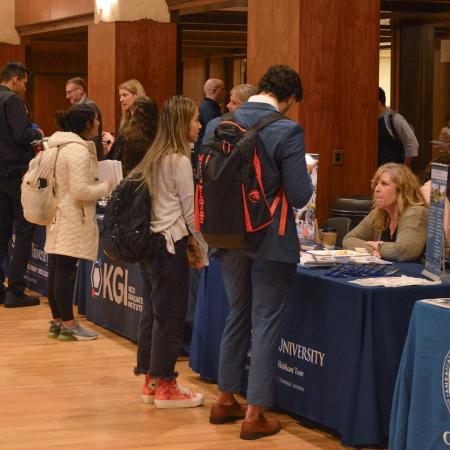Scholarships and financial aid are available through OSU, the College of Science, the College of Agricultural Sciences and the Department of Microbiology. Scholarship applications are submitted through the online ScholarDollars. The Department of Microbiology scholarships are awarded to students who have been declared microbiology majors for at least two terms. Most scholarships require a cumulative OSU GPA and last-two-term GPA of 3.0 or better at the end of the term preceding the application. Applicants must have a declared major in Microbiology and recipients must be a microbiology major the entire year of the scholarship. Post-baccalaureate students are not eligible. Recipients must be enrolled full-time (minimum 12 credits) in the College of Science at OSU during the entire scholarship year. The scholarship is divided into three terms and will not be awarded for terms below full-time credit.
Scholarships are awarded annually on a competitive basis, with typical awards of $500-$2,000. Eligibility varies depending on the particular award, and the number of awards given each year is dependent upon funding. Department of Microbiology scholarships are made possible by donations provided by alumni, faculty members, and other donors. Scholarship recipients are required to attend an awards luncheon in early May to receive their scholarships and to meet donors.
In addition, the Department of Microbiology offers the Sheila Van Zandt Student Research Experience Scholarship to promote collaboration between a graduate student and undergraduate student and must be applied for by a graduate/undergraduate pair separate from other scholarships and the ScholarDollar application.
Important dates
November 1st online scholarship portal open
Undergraduate Scholarship Applications are processed through the online application portal, ScholarDollars. Department of Microbiology, College of Science and University Scholarships are applied for through this one application. Submit your OSU ScholarDollars application between November 1 and February 15 to maximize the number of scholarships for which you will be considered.
The Oregon State University Student Financial Aid Office provides information on general OSU scholarships, Emergency Scholarship Fund, and other financial assistance.
Awards are announced and presented at Scholarship Luncheon between late April and early May.
Microbiology and BioHealth Sciences Scholarships
Thomas R. and Martha S. Aspitarte Scholarship
Established by family and friends to honor Dr. Aspitarte, who received his M.S. and Ph.D. degrees in Microbiology from OSU in 1953 and 1959, respectively. Criteria: Undergraduate "upperclassman" students in Environmental Microbiology.
Matthew A. Bacho Scholarship
Established by Matthew Bacho to provide scholarships for students in the Department of Microbiology, undergraduate or graduate, with demonstrated financial need. Criteria: Microbiology or BioHealth Sciences major; financial need.
Debbie S. Bellinghausen Microbiology Student Support Fund
Established by Debbie Bellinghausen to support undergraduate or graduate students with financial need enrolled in the Department of Microbiology, including travel for professional development, collaborative research projects, and scholarship support. Criteria: Microbiology or BioHealth Sciences major; financial need.
Cohen-Wolf BioHealth Scholarship
Established by Aaron Wolf and Ariella Cohen Wolf to support BioHealth Sciences undergraduate students at Oregon State University who are engaged in a course of study that will allow them to pursue a career as a provider of care in the health fields. Criteria: BioHealth Sciences major; course of study that prepares for career as provider of care in health fields. Min. 45 credits, 3.4 GPA, no other major, one more year of study.
P.R. Elliker Scholarship in Microbiology and Food Science
Dr. Elliker joined the faculty of Oregon State University in 1947 and taught general microbiology, food microbiology and dairy microbiology. He served as Chair of the Microbiology Department from 1952 until his retirement in 1977. In 1950, he authored "Practical Dairy Bacteriology," and authored or co-authored more than 200 technical papers and abstracts on microbiology. He received the prestigious Borden Award for Research in dairy microbiology in 1954. He also served as a key consultant to NASA for sanitation life support systems. Criteria: Outstanding juniors or seniors in Microbiology; focus on food safety.
Eleanor G. Ford Memorial Scholarship
Established by Eleanor G. Ford to assist students majoring in Microbiology with education expenses. Ms. Ford graduated from Oregon State University in 1962 with a B.S. in Microbiology. Criteria: Juniors who are Microbiology or BioHealth Sciences majors. Financial need is a consideration along with GPA. Preferences are for those in the lowest income groups, and for those who have demonstrated the potential for promising careers in public health Microbiology.
Excellence in Microbiology
Anonymous donors established this scholarship to support undergraduate students in the Department of Microbiology.
Helen Alford Hays Women in Microbiology Scholarship
Established in 1991 by Helen and Dale Hays. Helen (OSU 1956) was employed by the OSU Department of Microbiology from 1955-1981, and Dale was employed by Veterinary Medicine. Helen was an undergraduate adviser and instructor in Microbiology and technically assisted Dr. P.R. Elliker, who was Chairman of the Department at that time. Criteria: Undergraduate women in Microbiology with minimum GPA of 3.00.
Mark H. Middlekauf Scholarship
Established by Ruth M. Tyson to honor the memory of her brother and to aid students in bacteriology. Mark Middlekauf received his degree in bacteriology from OSU in 1916, served in the army during WWI, and lost his life in France during the conflict. Criteria: Outstanding Microbiology junior or senior who is also performing undergraduate research.
Donald and Barbara Overholser Scholarship
Don was born in Independence, OR. He proudly served in the U.S. Coast Guard from 1953 to 1957 and then attended Oregon State University, receiving his degree in Microbiology. He worked for the Department of Microbiology from 1966 to 1992 as Senior Instructor teaching medical microbiology and was the chief adviser for undergraduate students. He was awarded the OSU Dar Reese Excellence in Advising Award in 1989 and his former office is now the Don Overholser Undergraduate Computer Laboratory. Criteria: Outstanding junior students majoring in Microbiology.
Joseph E. Simmons Scholarship
Established by his widow, friends and colleagues, with the first award made in 1952. Professor Simmons joined the Bacteriology Department in 1921 and taught General Bacteriology, Pathogenic Bacteriology, Immunology, Clinical Laboratory Methods, Food Bacteriology and Dairy Bacteriology. Professor Simmons became Chairman of the Department of Microbiology in 1950 and died in 1951. The scholarship was established to honor Professor Simmons’ untiring efforts on behalf of students, his interest in developing the Department of Microbiology, and his direct and indirect contributions to his field of science. Criteria: To promising undergraduate students in Microbiology.
Kathryn Tinnesand Memorial Scholarship
Established by the family and friends of former OSU Department of Microbiology undergraduate (B.S., 2004) and graduate student Katy Tinnesand after her tragic death in a mountain climbing accident in 2005. Criteria: Microbiology junior or senior with a minimum GPA of 3.00. Must be participating in undergraduate research at OSU and demonstrate promise and enthusiasm for research in Microbiology.
Sheila Van Zandt Student Research Experience Scholarship
March 1, deadline
This scholarship will be awarded to an undergraduate/graduate student research team based on merit of the proposed research. The students are to fill out the attached form, including a budget, 1 page proposal and signatures of the students and faculty member supporting the research. The research proposal should be prepared collaboratively. As the donor intends to provide support to both the undergraduate researcher and graduate mentor, the budget can include travel support for either or both students, undergraduate salary and money for supplies (and other costs if justified). One more more projects will be funded annually at $1800 each. We hope that the students will be able to use this as leverage for travel funds from the College of Science and Graduate School. Proposals are due March 1 and awards will be made by April 15 to allow research summer term. Requirements of the award are a thank you letter to the donor and a poster presentation at the undergraduate research symposium or presentation at another department venue during the year in which the award was received.


